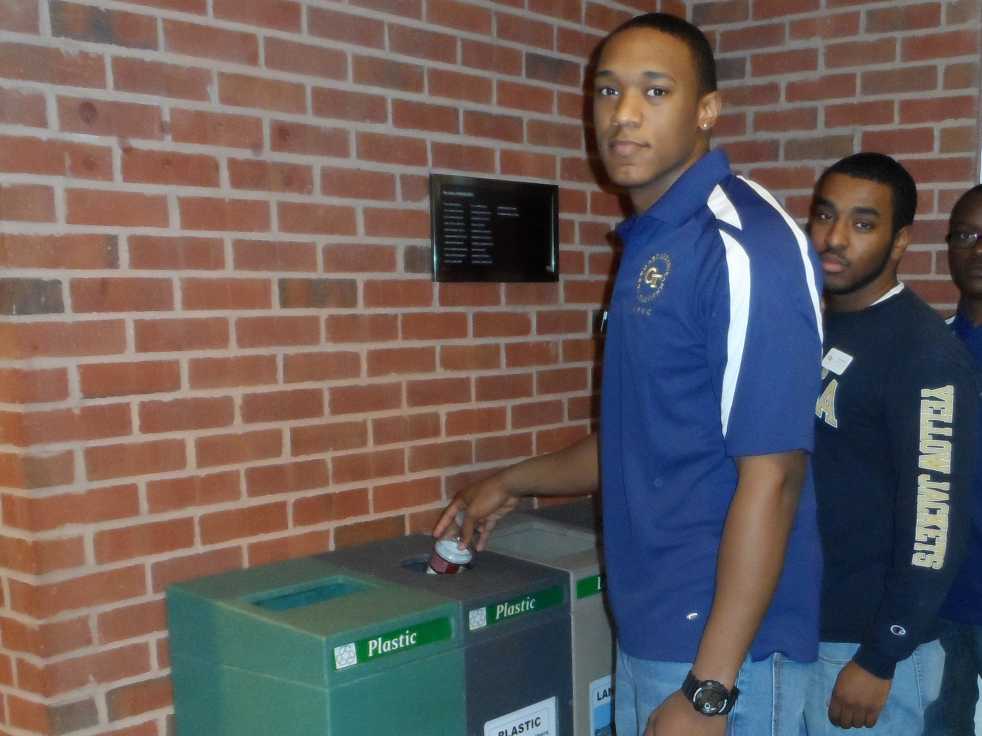
Starting Spring Break, Housing will implement a new single stream recycling system to replace its multi-stream process.
This article originally appeared in the Feb. 15 issue of the Technique.
Starting Spring Break, the Department of Housing will implement a new single stream recycling system to replace the multi-stream process that Georgia Tech currently uses.
“Single stream recycling means that students don’t have to sort out their recycled trash,” said Bob Canada, the Procurement Officer for the Department of Housing.
Student recycling is expected to go up by 20 to 30 percent by the end of this semester…
The new system will use a single, large green bin to collect all recyclables, replacing the set of blue waste bins labeled for glass, aluminum, plastic and paper. This method will allow students to empty all of their recycling at once in the same bag. Under the current system, students have to manually sort, a task many students may find time consuming and inefficient.
Housing has contracted Waste Management, a private corporation that helps with finding environmental solutions, to help them implement the change to the new system. The idea is to help streamline efficiency in the recycling process at Tech, especially from students living in on campus housing.
“We thought, what’s the next new thing in the area of sustainability?” Canada said.
Canada’s department handles the contracting and procurement of campus needs such as managing waste. They also led efforts to put new systems, like single-stream recycling, into place to recycling easier.
With this system, most of the typical waste collection methods will stay the same. The locations of trash collection will not move and Housing will continue to take items such as batteries and light bulbs separately. New items will also be collected, including plastic bags, pizza boxes and similar items. Waste Management still has strict requirements regarding how single stream recycling works, however. As with multi-stream recycling, cans and containers must be empty of contents and free of food residue. They also emphasize the need to leave out biohazardous or flammable materials.
The waste management program at Tech ensures that none of the recycled waste will go to landfills. Instead, it all goes to a facility in Chattanooga, Tenn. called Rock-Tenn. There, materials go through both manual and automatic cycles to be compacted and sent out to create new, reusable materials.
Housing hopes to market this new implementation by sending out e-mails to students, placing flyers and door tags in residence halls and posting videos, news and articles on the Housing website. Information will also be given to RHA and Residence Life if students have any concerns.
“Recycling is going pretty well on campus, but we want to put out new ideas,” Canada said.
Housing expects a strong response from students in their recycling efforts. Student recycling is expected to go up by 20 to 30 percent by the end of this semester, and potentially even higher next fall with the entry of new freshmen. Once students become accustomed to the new system and realize its efficiency, a steady growth in awareness is anticipated.
“This is a great initiative, because not only will it make it easier for me to recycle, but will encourage other students to do the same.”
“It’s really important to recycle, because it allows us to preserve valuable resources, clean up the environment and even save energy,” said Gayathri Ganghadaran, a first-year COB major, who recycles in her freshman dorm on a regular basis.
“I do my best to recycle as much as possible. This is a great initiative, because not only will it make it easier for me to recycle, but will encourage other students to do the same,” said second-year PHYS major Luke Buffardi.
The Housing Department gets charged more when items go into trash instead of recycling, so the project, by increasing recycling, should reduce trash as well. This will increase cost efficiency and it is anticipated to offset the $1,200 that will be paid monthly for the recycling service.
Other institutions, like MIT, University of Michigan and Yale, have already established single-stream recycling systems on their campus. MIT, for example, implemented this system in 2009, according to an article by the school newspaper The Tech.
“Sustainability is part of the housing mission statement. We say, why not do it if it’s easy?” Canada said.
